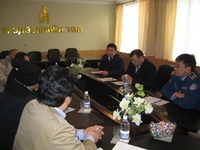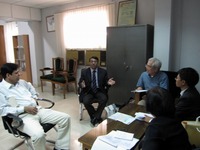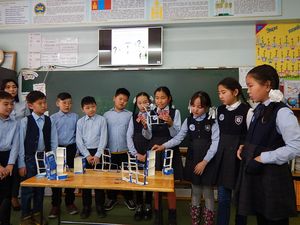Activity Report: Area & Country >> Mongolia
The meeting was opened by welcome remarks by General Badral Tuvshin,Chief, National Emergency Management Agency, Government of Mongolia, followed by the opening remarks by Mr. Robert Glasser, Special Representative of Secretary-General for Disaster Risk Reduction, and the introduction of the agenda by Ms.Madhavi Ariyabandu, Officer-in-charge, UNISDR Regional Office for Asia Pacific. Session 1 chaired by Colonel Ganzorig Tsogtbaatar, Deputy Chief, NEMA, discussed the outcomes of AMCDRR 2016, followed by updates from the participating countries and international organisations.
Day 2 continued updates including that by ADRC regarding the four priorities of the Sendai Framework including Kumamoto study visit, tsunami workshops, GLIDE, the 10 years' anniversary of Sentinel Asia. Ms.Saya, Director, Cabinet Office who arrived on Day 2, provided an informative report on recent policy progress regarding tsunami DRR, lessons learnt from the Kumamoto earthquakes, gender issues, and OEIWG.
Preparation for the AMCDRR 2018 was then discussed based on a report made by the host country.In addition to the organizational issues including the dates and venue, Mongolia provided its initial proposal of priority issues of "Urban disaster resilience" and "Investment in DRR", which participants discussed by splitting themselves into three groups.
Day 3 first focused on the OEIWG and monitoring of Sendai Framework. UNISDR briefed about the Sendai framework and monitoring system, on which countries reported by referring to the status including collaboration with statistical organization.
In many countries, information relevant to natural disasters is likely to belong to line ministries or regional entities, and statistical bureau in charge of SDGs action plan may face difficulties to work for DRR, although majority of DRR organisations seem not yet to have established close relationships with the Statistical bureaunin individual countries.
Afternoon session of Day3 was first dedicated to the group exercise on the OEIWG outcome, which facilitated participants unfamiliar to the two years' discussion by OEIWG learning the outcome,although there seems to be significant gaps among participants in their understanding of the OEIWG outcome.
In the last session, participants shared the status of preparation and participation in GP to be held in Cancun in May with each other.
The three days' meeting was then closed by General Badral Tuvsin's remarks.

(2017/04/20 12:30)
Through many of natural disasters experiences, Japan has accumulated knowledge of dealing with disasters and developed its expertise together with advanced policies and technologies in the area of disaster risk reduction. This unique experience provides Japan with many valuable knowledge and expertise that it must now endeavor to share effectively with other members of the international community. From this point of view, this project is launched by the Cabinet Office of Japanese Government last year. Mongolia and Indonesia were selected as target countries of the FY2010 project.
<Mongolia>
Following the preliminary discussion for project implementation in Mongolia in December 2010 and the study tour in Japan for the official of the National Emergency Management Agency (NEMA): the implementing agency in January 2011, the workshops enhancing disaster risk reduction (DRR) capacities through transferring the measures and tools of Japan were conducted.
On 13-19 February 2011, the NEMA Mongolia in collaboration with the government of Japan and the ADRC conducted a series of workshops and trainings for strengthening the capacities for earthquake disaster education. They include trainings for the NEMA officials and school teachers, a workshop to learn Japanese DRR exercises utilized creative and innovative ideas, and lecture for school students, and DRR exercises in two target schools.

Through the above mentioned activities, the NEMA and the related organizations and schools learned various knowledge, techniques, and tools for enhancing and promoting earthquake disaster education in Mongolia. We believe this project became one of the major driving forces for further promotion of earthquake DRR in Mongolia.
5-10 December 2010 (Ulaanbaatar, Mongolia)
12-16 December 2010 (Dhaka and Noakhali, Bangladesh)
Since 2009, ADRC has initiated a pilot project of ADRC Peer Review with the aim of developing DRR capacity of ADRC member countries by sharing information and strengthening the relationship among member countries. This year Mongolia and Bangladesh were selected as target countries among applications from ADRC member countries. After the submission of country reports by the two target countries, reviewer teams, which consist of two officers from member countries, one expert from Japan and one or two from ADRC per a target country, have visited target countries to conduct interview surveys.
<Mongolia> On 5-10 December 2010, the ADRC reviewer team, composed of Prof. Masato Motosaka (Earthquake Disaster Research Laboratory, Disaster Control Research Center, Graduate School of Engineering, Tohoku University), Mr. Tshering Kezang (Governor, Dzongkhag Administration, Lhuentse, Bhutan), Mr. Vizesh Rana (Deputy Commandant, Ministry of Home Affairs, India) and two ADRC staff members visited Ulaanbaatar, Mongolia. During the four day survey, the team visited various ministries and institutions related to DRR activities, including NEMA: National Emergency Management Agency (ADRC's counterpart in Mongolia), to examine how they have been making the efforts for earthquake disaster education and capacity development by government and non-governmental organizations in Mongolia. Then, the team conducted on-site review of the building condition, and prepared a draft report of the survey result with all findings and recommendations. On the last day of the survey, a workshop was held for getting opinion and comments to finalize the report and attended by about 30 NEMA officials. The representative from Bhutan and India also made presentations on their efforts for earthquake disaster reduction in the workshop. It provided a very good opportunity for exchanging opinions each other.
On 5-10 December 2010, the ADRC reviewer team, composed of Prof. Masato Motosaka (Earthquake Disaster Research Laboratory, Disaster Control Research Center, Graduate School of Engineering, Tohoku University), Mr. Tshering Kezang (Governor, Dzongkhag Administration, Lhuentse, Bhutan), Mr. Vizesh Rana (Deputy Commandant, Ministry of Home Affairs, India) and two ADRC staff members visited Ulaanbaatar, Mongolia. During the four day survey, the team visited various ministries and institutions related to DRR activities, including NEMA: National Emergency Management Agency (ADRC's counterpart in Mongolia), to examine how they have been making the efforts for earthquake disaster education and capacity development by government and non-governmental organizations in Mongolia. Then, the team conducted on-site review of the building condition, and prepared a draft report of the survey result with all findings and recommendations. On the last day of the survey, a workshop was held for getting opinion and comments to finalize the report and attended by about 30 NEMA officials. The representative from Bhutan and India also made presentations on their efforts for earthquake disaster reduction in the workshop. It provided a very good opportunity for exchanging opinions each other.
<Bangladesh>
 Another reviewer team composed of Dr. Taiichi Hayashi of Research Center for Fluvial and Coastal Disasters of Disaster Prevention Research Institute of Kyoto University, Mr. San Kung from Myanmar's Relief and Resettlement Department, Ministry of Social Welfare, Relief and Resettlement, Ms. Crispina B. Abat of Philippines' Office of Civil Defense, and Ms. Yumi Shiomi of ADRC visited Bangladesh on 12-16 December 2010 to conduct a survey for learning about their ongoing efforts for Cyclone Preparedness in the country. The survey began with visiting relevant organizations in Dhaka such as Disaster Management and Relief Division of Ministry of Food and Disaster Management (ADRC's counterpart in Bangladesh), its Disaster Management Bureau, Bangladesh Meteorological Department, Bangladesh Water Development Board, Institute of Water Modeling and Bangladesh Red Crescent Society. Then the team moved to cyclone-prone Noakhali District in the coastal region to learn the situations through interviewing local DRM officials, volunteers and residents, and visiting cyclone shelters and embankments. The team members with cyclone expertise and experiences of severe storm countermeasures in their countries actively shared opinions during the survey.
Another reviewer team composed of Dr. Taiichi Hayashi of Research Center for Fluvial and Coastal Disasters of Disaster Prevention Research Institute of Kyoto University, Mr. San Kung from Myanmar's Relief and Resettlement Department, Ministry of Social Welfare, Relief and Resettlement, Ms. Crispina B. Abat of Philippines' Office of Civil Defense, and Ms. Yumi Shiomi of ADRC visited Bangladesh on 12-16 December 2010 to conduct a survey for learning about their ongoing efforts for Cyclone Preparedness in the country. The survey began with visiting relevant organizations in Dhaka such as Disaster Management and Relief Division of Ministry of Food and Disaster Management (ADRC's counterpart in Bangladesh), its Disaster Management Bureau, Bangladesh Meteorological Department, Bangladesh Water Development Board, Institute of Water Modeling and Bangladesh Red Crescent Society. Then the team moved to cyclone-prone Noakhali District in the coastal region to learn the situations through interviewing local DRM officials, volunteers and residents, and visiting cyclone shelters and embankments. The team members with cyclone expertise and experiences of severe storm countermeasures in their countries actively shared opinions during the survey.
This project aims at developing the mutual learning process among the ADRC member countries instead of one-way learning. After the survey missions, reviewer teams will compile survey reports and send them to target countries and then to ADRC member countries to enhance cross-fertilization.
ADRC would like to express its sincerest gratitude to all of those who have made precious contribution to this project this year.
(2010/12/21 17:40)


